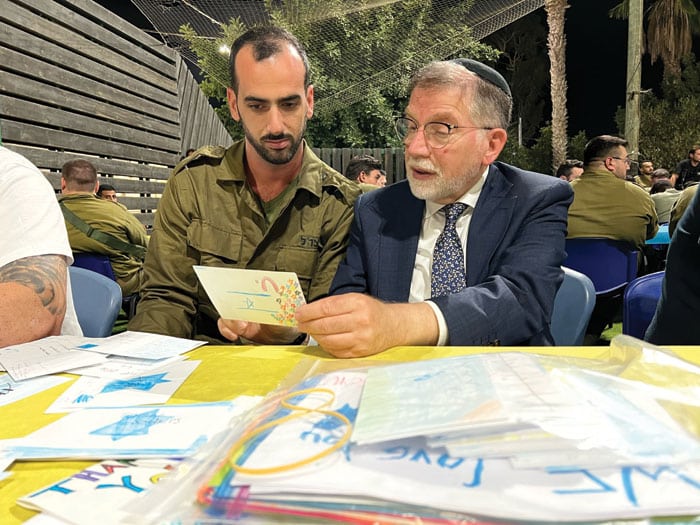 Rabbi Muskin with a soldier, reading him cards LA children made (Courtesy Rabbi Elazar Muskin)
Rabbi Muskin with a soldier, reading him cards LA children made (Courtesy Rabbi Elazar Muskin) Rabbi Elazar Muskin, Rabbi Jason Weiner and Rabbi Yosef Kanefsky, three Los Angeles rabbis, were at the Shura Rabbinic Army Base in central Israel, looking at rows of containers full of dead bodies from the October 7 massacre.
“While we were standing there, they opened the containers, and the smell overtook us,” said Muskin. “It was so heart wrenching to see what this really meant.”
While Jewish law requires that dead bodies be buried within 24 hours, these bodies had been sitting in freezers in containers for weeks. They had still not been identified, even with teams of rabbis and experts on the scene night and day, using every method possible to determine who was killed.
“They were distraught that they could not identify every body, while families are waiting to find out,” said Muskin, senior rabbi at Young Israel of Century City. “No money is spared.”
Muskin, Weiner and Kanefsky were part of a Rabbinical Council of America (RCA) mission to Israel and were joined by a small group of other rabbis from across the United States. The RCA’s missions – which take place every week – aim to show America’s solidarity with Israelis during this difficult time. The groups are intentionally small, with only 10 to 15 rabbis on each trip, so that Israel has continuous and ongoing support.
“I love Israel. It seemed like a meaningful thing to be able to do.” – Rabbi Jason Weiner
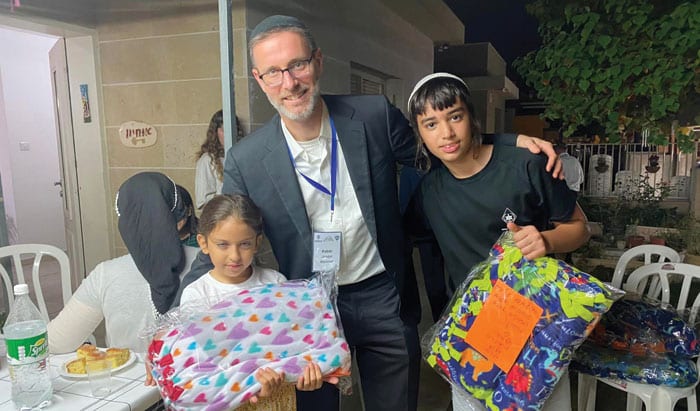
“We want to be doing something for Israel,” said Weiner, who is senior rabbi and director of the Spiritual Care Department at Cedars-Sinai Medical Center and rabbi of Knesset Israel Synagogue of Beverlywood. “I had heard Israelis say how much it means to them when Americans show up in solidarity. I love Israel. It seemed like a meaningful thing to be able to do.”
Weiner posted daily updates of the trip on his social media pages, showing the rabbis traveling throughout the country and interacting with survivors of the attack, soldiers, fellow rabbis and civilians.
A Heartbreaking and Memorable Mission
The first full day in Israel was spent in Jerusalem, where Muskin, Weiner and Kanefsky, senior rabbi at B’nai David-Judea Congregation, prayed at the Kotel and shopped, supporting the tourist economy, which has been suffering since the attacks.
“Happy to report that [the Kotel is] packed at 5:30 a.m.,” Weiner posted that day online. “Everything seems normal here (other than the sign indicating where to go in case of incoming missiles, and perhaps the intensity of the prayers). It’s so good to be here and to see the resilience of the Jewish people.”
The rabbis went to Hadassah Medical Center in Jerusalem, where they visited with patients, including solders, who were injured. The hospital had set up an entire underground hospital in preparation for any type of scenario.
“There was so much overlap between what I experienced at Cedars-Sinai during COVID and what Hadassah is experiencing now with the overflow of patients,” Weiner said. “Except at Hadassah, it’s so much harder, because they are also being bombed at the same time.”
After seeing the hospital, the rabbis traveled to the Shura Rabbinic Army base, where they saw the containers of bodies and met with members of the IDF’s rabbinate. They are currently taking care of burying the soldiers and civilians.
“We said Tehillim and a memorial for the dead as we stood there,” said Muskin. “It was the most meaningful expression of prayer I’ve had throughout this war. We are constantly saying Tehillim in shul morning and evening. But standing there, it was a totally different reality.”
According to Muskin, the army base was remodeled recently, and the rabbis don’t normally perform this kind of work. One rabbi Muskin met told him his sole job was to kasher the camp once a year before Pesach.
“Now, he’s identifying dead bodies and burying them,” said Muskin.
To ensure that the rabbis have support, the government has sent in a group of army psychologists.
“After listening to one of the rabbis for 15 minutes, the psychologist said, ‘I can’t anymore. You’re breaking me.’” – Rabbi Elazar Muskin
“After listening to one of the rabbis for 15 minutes, the psychologist said, ‘I can’t anymore. You’re breaking me,’” said Muskin. “He couldn’t help because it was so overwhelming.”
Weiner said, “The military rabbis who work on that base asked us to include them in our prayers for the sick – not because they got injured on the job, but because the prayer for the sick includesaa prayer for a ‘healing of the soul.’”
While at the base, the rabbis heard and felt the loud booms of missiles being intercepted by the Iron Dome in the sky above them.
“We were hearing explosions the whole time,” said Weiner. “A few of them were really loud and they shook the whole place. The people there didn’t even flinch. They said they were used to it.”
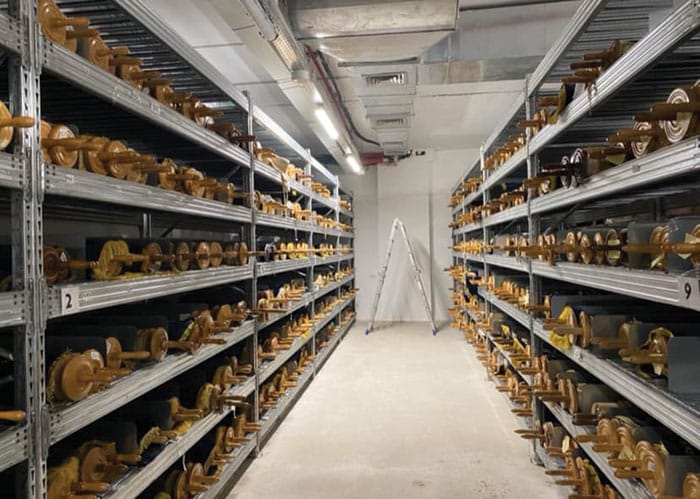
(Photo courtesy Rabbi Jason Weiner)
Also on the base was a warehouse full of 1,000 Torah scrolls, which Muskin said was the largest in the world. The scrolls, which are going into battle with the soldiers, are constantly being checked by sofers to ensure they are kosher.
Additionally, religious and non-religious soldiers are asking for tzitzit to wear. They have to be custom-made to match the IDF uniforms, which are green. Initially, 60,000 tzitzit were manufactured, and they immediately went out. Another 60,000 were made and sent out. Now, they’re onto a third round to keep up with the demand.
“I talked to a rabbi there and asked him if he was surprised that people were turning to religion,” Weiner said. “He told me it wasn’t about turning to religion in a hard time. It’s about our identity, our core of who we are as Jews. We were attacked as Jews. People say we are fighting to stay Jewish and have a Jewish state. The attitude is, if I am Jewish, I want to practice Jewish customs.”
Yeshivat Sha’alvim was the next stop on the mission. It had taken in an entire displaced yeshiva from Sderot, and students greeted the rabbis by singing, dancing and jumping up and down.
“They were so appreciative we visited,” said Weiner. “It was so nice to see what their communities were doing to rebuild.”
However, while at the yeshiva, one encounter with a student left Weiner distraught.
The student was shocked that American Jews were visiting Israel.
“Why?” Weiner asked.
“I saw the video of the American Jews marching against Israel in the Capitol,” he said. “I thought you didn’t support us.”
Weiner assured him that this was a fringe group of Jews and that most American Jews are supportive.
“It’s important for us to send supplies, advocate for Israel and attend events and rallies that will get a lot of media attention,” Weiner said. “That’s something these kids will see. That’s something that will go a long way.”
After leaving the yeshiva, Weiner, Muskin and Kanefsky headed south to meet with survivors of an attack on Zikim Kibbutz, which is on the northern border of Gaza. They talked with members of the volunteer security team, who managed to protect the kibbutz when the terrorists tried to attack it.
One man recalled his experience: the day of the massacre, men in IDF uniforms approached him, and he felt something was off. Then, one of them took out a rocket launcher and aimed it at him, and he immediately recognized that the IDF wouldn’t do that. He took out his gun and shot all of the attackers, protecting his kibbutz.
When Kanefsky heard this story, he was inspired by the man’s resiliency after experiencing such trauma.
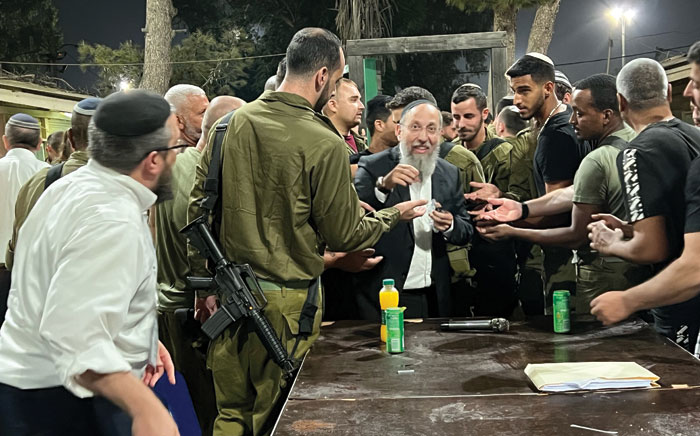
“I was overtaken by his enduring commitment to see the kibbutz come back to life and the way in which it was so important to his concept of Zionism that it comes back to life and becomes repopulated,” he said. “He was honest about the reality that many, if not most, are going to be exceedingly hesitant to come back, given the volatility of the security situation. It would be a great triumph for the State of Israel if people were to feel secure enough to return. It remains to be seen.”
Residents of Ofakim, which is just outside of Gaza, had the same experience, but they didn’t react the same way.
“A lot of people knew something was wrong, but they didn’t shoot because these men were in IDF uniforms,” said Weiner, who went to Ofakim with his colleagues. “They trusted them until they realized it was too late.”
The terrorists killed 44 members of the Ofakim community. A woman who had lost her brother and nephew showed the rabbis the exact spot where it happened. She also explained that the previous week, every home on the block was a shiva house, and they were still crying.
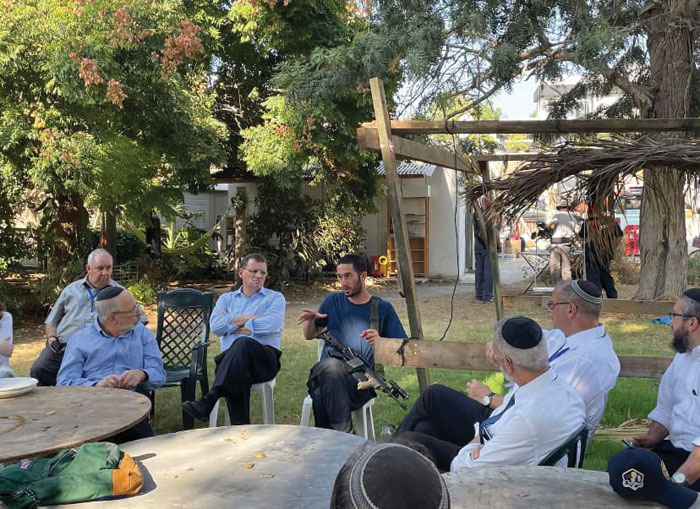
(Photo courtesy Rabbi Jason Weiner)
“The massive bullet holes still in the walls demonstrated what heavy machinery was used that day to slaughter civilians,” said Weiner.
The rabbis also saw the home of Rachel Edri, who cooked for her five Hamas captors for 20 hours until the IDF came in with drones and killed them. Rachel and her husband David ended up surviving and sharing their story.
The community of Ofakim was mourning together, but there was also an incredible sense of unity. The city was giving out free ice cream to the children, and neighbors were taking care of orphaned children and looking out for one another. One woman told Weiner, “In every generation, they rise up to kill us, and we survive. This is now the job of our generation to survive and rise to the occasion, to give to each other and to overcome adversity.”
Rabbi Doron Perez, whose one son got shot in the leg during battle and whose other son was taken hostage by Hamas, spoke to the rabbis about having emunah.
“He talked about his faith in God and the Jewish people,” said Weiner. “It’s so unbearably painful not knowing where his son was. Despite all he’s going through, he still has a positive and hopeful vision for the world.”
Weiner, Muskin and Kanefsky had the opportunity to visit an IDF army base and eat barbecue with the soldiers. There, they handed out cards from children back in the U.S. Muskin gave them over 200 cards from kids in L.A.
“One soldier said, ‘Look! An 8-year-old in LA is blessing us that we should be successful. It touched them very much.” – Rabbi Elazar Muskin
“They lapped them up, they grabbed them,” he said. “You should have seen how much the IDF soldiers wanted them. One soldier said, ‘Look! An 8-year-old in L.A. is blessing us that we should be successful!’ It touched them very much. It was the most precious item they felt they could get.”
While the rabbis were on the base, word came in that 14 IDF soldiers had been killed in Gaza.
“It was such a raw and painful feeling to be one of the first to hear about this,” Weiner said.
The next day, everyone attended the funeral of one of the soldiers, where thousands of Israelis showed up and singer Ishay Ribo started to sing – but he quickly broke down in tears and had to stop.
“We felt that this is Am Yisrael, we are part of the Jewish nation and we are comforting each other,” Weiner said. “This soldier died protecting us, and we’re showing our respect to him. I saw people there hugging who didn’t seem to know each other. I gave a soldier a hug.”
Right before the end of the trip, the rabbis made a stop at a hotel where refugees were living and prayed with them. They gave out gift cards to the people in need, especially the poor people, but ran out before everyone could get one.
“They said ‘It’s nice of you, but you being here is what matters,’” Weiner said.
What Comes Next?
Israel has not had time to properly mourn following the massacre on October 7. Weiner foresees a long road ahead for Israelis who are dealing with the emotional trauma of that day.
“People are not yet ready to talk about it,” he said. “A few said they were going to have questions but they can’t talk about it because it’s too raw. We are not at that phase yet. There is a war going on. There has been no time to mourn or grief or ask those questions.”
For Kanefsky, the trip was profound, but so is the pain.
“The sense of anguish is simply inescapable. The anxiety about what is happening in the present moment and what the ultimate outcome will be is ever present.” – Rabbi Yosef Kanefsky
“I am not coping particularly well,” he said. “The sense of anguish is simply inescapable. The anxiety about what is happening in the present moment and what the ultimate outcome will be is ever present. In my best moments I hold out the hope and prayer that in this most counterintuitive sort of way, something much, much better eventually comes out of this – much better for Israel, and for Palestinians who want to co-exist with Israel in dignity.”
As for Americans who are standing by, sometimes feeling as if they aren’t doing enough, the rabbis had some advice: keep sharing news about Israel, send charity their way and visit if at all possible.
“Visits are very welcome,” Kanefsky said. “Israelis of all stripes very much recognize and feel the solidarity of diaspora Jews who simply show up in the country and say, ‘I’m here. I am part of this story too and I am with you.’ It’s very powerful to simply to put your feet on the ground there if you’re able to. My sense also is that it seems to be good in general to donate to established organizations on the ground in Israel who make the determinations for what is needed by soldiers and displaced families.”
As for Muskin, he’s already planning to go back soon – hopefully the week of Thanksgiving – and take members of his congregation with him.
“We have to demonstrate to Israel in its darkest time that we are there for them,” he said. “We need to show them that Israel has not been abandoned by American Jewry.”























 More news and opinions than at a Shabbat dinner, right in your inbox.
More news and opinions than at a Shabbat dinner, right in your inbox.